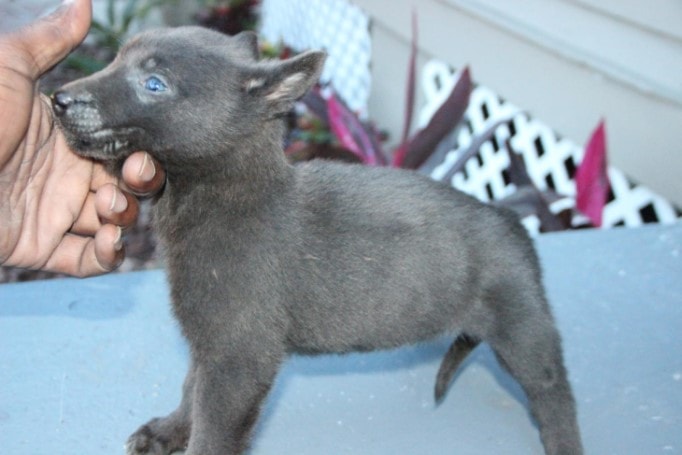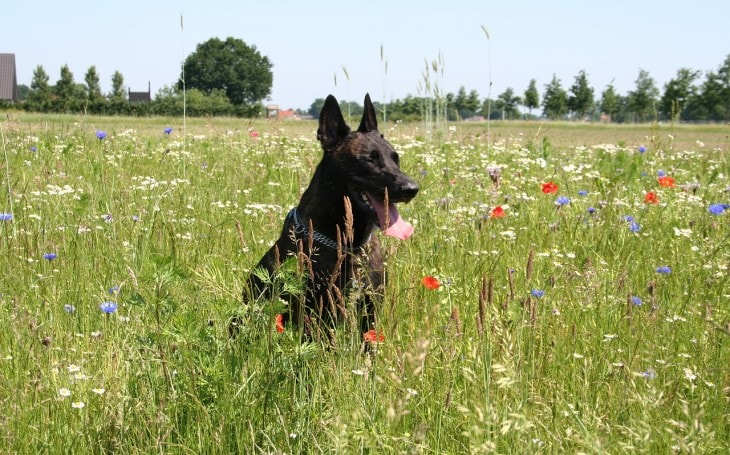Dutch Shepherd Dog Breed Information
General Information
| Dog Name | Dutch Shepherd |
|---|---|
| Other Names | Hollandse Herder |
| Scientific Name | Canis lupus familiaris |
| Breed Type | Shepherd |
| Group | Herding Dogs |
| Breed For | Herding and working on farms |
| Extinct | No |
| Country of Origin | Netherlands |
Physical And Size
| Size | Medium |
|---|---|
| Min Life Span | 11 |
| Max Life Span | 14 |
| Min Ideal Weight for male | 32 |
| Max Ideal Weight for male | 36 |
| Min Ideal Weight for female | 29 |
| Max Ideal Weight for male | 36 |
Ranking
| Intelligent Rank | |
|---|---|
| Trainability | |
| Playfulness | |
| Affection Level | |
| Social Needs | |
| Barking | |
| Watchdog Ability | |
| Territorial | |
| Mouthiness | |
| Adaptability |
Characterisitics
| Temperament | Intelligent, Hard-working, Athletic |
|---|---|
| Prey Drive | Yes |
| Fighting Dog | No |
Friendliness
| Stranger Friendly | Low |
|---|---|
| Child Friendly | Medium |
| Cat Friendly | Medium |
| Dog Friendly | Medium |
| Office Friendly | Low |
| Apartment Friendly | Medium |
| Senior Citizens Friendly | Medium |
| Service Dog | Medium |
| Search and Rescue Dog | Medium |
| Biting Potential | Low |
| Country of Origin | Netherlands |
| Nicknames and Other Names | Hollandse Herder, Dutch Herder |
| Scientific Name | Canis lupus familiaris |
| Breed Type | Purebred |
| Group | Herding Dogs |
| Bred For | Herding cattle and working on the farm |
| Size | Medium-sized |
| Recognized By | FCI, AKC, UKC, CKC, ANKC, NZKC |
| Life Span | 11-14 years |
| Ideal Weight | 66-88 pounds |
| Ideal Height | 22-24 inches (male and female) |
| Fur Type | Both short and long, rough-haired |
| Common Colors | Gold Brindle, Yellow, Silver Brindle |
| Markings | None |
| Availability | Moderately available |
| Achievements | Police Dog |
| Suitable for Apartments | Moderately suitable |
| Used in World War | No |
| Most Similar To | Belgian Malinois |
Dutch Shepherd is a lively, alert and intelligent breed, they maintained their herding instincts for which they were developed. These breeds were originally bred to keep flocks of sheep in a particular location, for which they are perfect runners.
The Dutch Shepherd is considered to be an
Origin & History
The Dutch Shepherd breed is originated in the Netherlands in the 1800s. Thy were mainly bred to herd sheep, cows, and other livestock and to protect farms and alert from strangers.
Dutch Shepherds are known to be loyal and intelligent companions and workers. The need for Dutch started to get decrease after the industrialization came to existence. Some Dutch Shepherd fans created the Nederlandse Herdershonden Club in 1898 to promote the Dutch Shepherd.
Are They Child Friendly?
The Dutch Shepherd are very smart and energetic, and this is what makes them an ideal family companion for children as well. They are gentle and protective towards children.
Like all other breeds they should be supervise when playing with children to make sure play time doesn’t get out of hand. Along with that your children should also be trained on how to approach with dogs to avoid accident.
Behavior, Temperament& Personality
The Dutch Shepherd is highly trainable and eager to please dogs. The temperament is loyal, affectionate, alert, obedient, reliable, intelligent.
Dutch Shepherd makes very good guards and they are very loyal to their owners. The Dutch Shepherd is very strong. Their bite force is 224 PSI, their bite can even break a man’s arm in a second.
The Dutch Shepherd owns a very playful personality. Everytime you play with, they are always excited and energetic. Plus kids will have an amazing playmate to play with.
For
Training
Dutch Shepherd is highly trainable dogs and known to be the healthiest and easiest to train dogs. They require adequate exercise and a confident trainer to make them their best.
They tend to be independent due to which they may be little reserved with strangers, therefore they need proper socialization soon after they are adopted. Since they are dominant by nature, so they need to be trained in a very calm and authoritative way. Avoid harsh training and commanding in loud voice.
Facts
Little facts about Dutch Shepherd Dog Breed:
- Dutch Shepherds have the second most powerful bite.
- They are often used in the Police department.
- They are independent but somewhat stubborn.
- Their jaws can be regarded as weapons.
Health Issues
| General Health | Healthy |
| Common Health Issues | Gonio Dysplasia, Hip Dysplasia, Patellar Luxation, Heart Disease, Dental Problem, Obesity |
| Hypoallergenic | No |
| Vaccination Required | Kennel Cough, Canine Coronavirus Rabies, Canine Distemper, Canine Parvovirus, Leptospirosis, Canine Parainfluenza |
| Shedding | Moderate Shedder |
| Drooling | Low Drooler |
| Grooming | Easy and Minimal Grooming Required |
| Weight Gain Potential | Low to Moderate |
| Separation Anxiety | Moderate Chance |
| Allergies | None |
| Diets and Supplements | Protein: 28% Fat: 12% Omega-3 and 6 Fatty Acid Glucosamine Antioxidant |
According to Dutch breed club, these breed don’t tend to suffer any serious physical or mental disorders, the few health issues include:
- Hip Dysplasia: Hip Dysplasia is the most common skeletal diseases seen in Dutch Shepherd.
- Gonio Dysplasia: It is an abnormal eye defect where fluid from the eye is restricted and cannot properly drain.
Colors
The Dutch Shepherd are found in various colors, which include:
- Brindle
- Gold Brindle
- Silver Brindle
- Grey Brindle
- Salt & Pepper
- Blue Grey
Puppies Of Dutch Shepherd

Adopting a Dutch Shepherd would be life-changing, not only for the dog but also for the owner. Buying Dutch Shepherd from a reputable breeder would be the safest. When buying a puppy, be sure that the breeder does genetic testing of their animals. And be sure to verify the health information.
Which Dogs Similar To Dutch Shepherd Dogs?
Visit Doglime For More Dog Breed Information and their behavior
Tags











7 thoughts on “Dutch Shepherd Dog Breed Information”